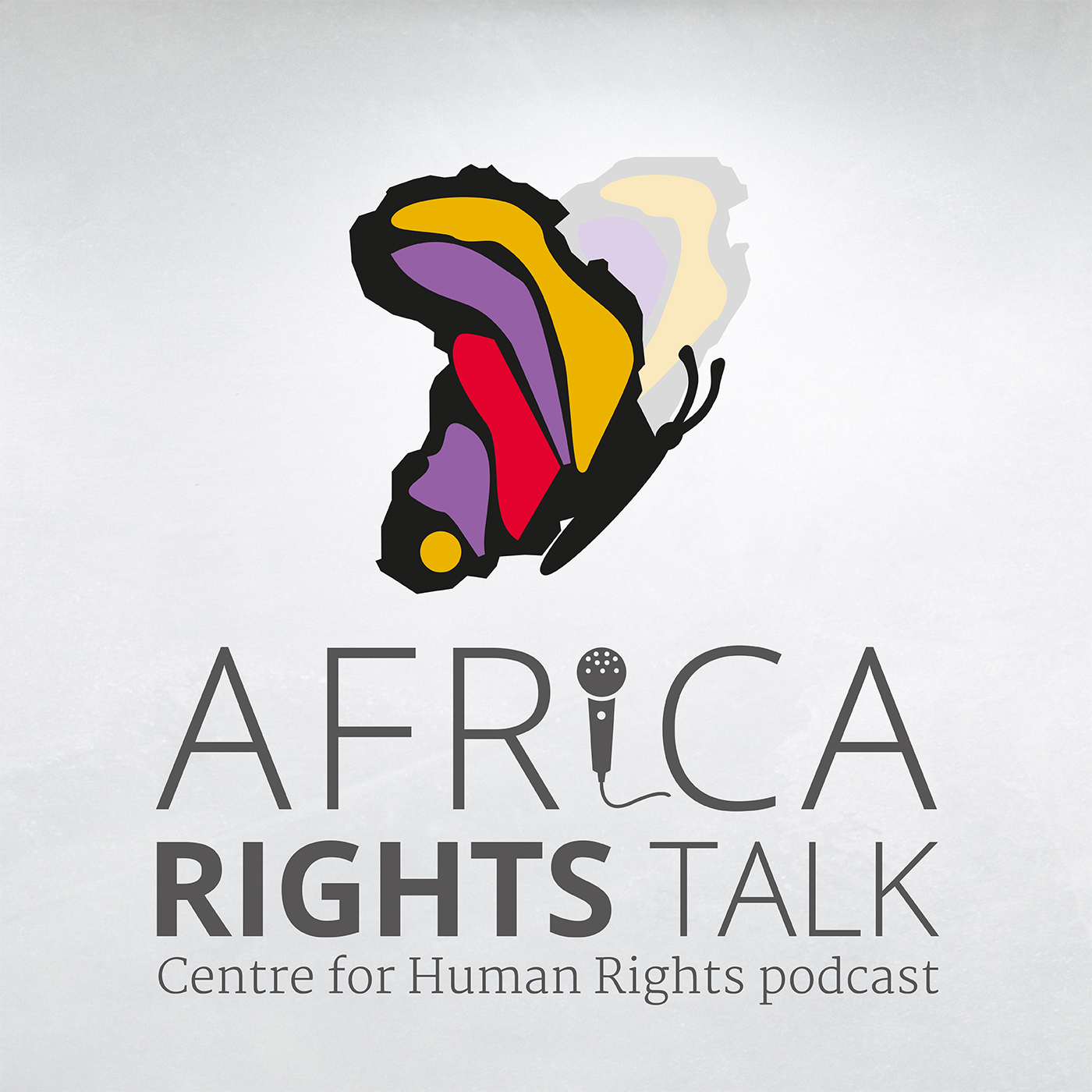Episodes
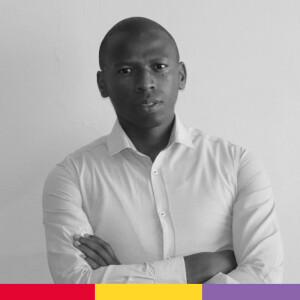
Sunday Aug 27, 2023
Sunday Aug 27, 2023
In conversation with Mokitimi Tšosane and Hlengiwe Dube.
In 2022, The Centre for Human Rights, University of Pretoria undertook a research and advocacy project that assessed the status of digital rights in Southern Africa. Guided by the report titled The Digital Rights Landscape in Southern Africa, the Centre embarked on a training and capacity-building workshop to enhance awareness and interest in digital rights among parliamentarians. This podcast series features various stakeholders who share their expertise on thematic areas covered during the training.
In this episode, Mokitimi Tšosane and Hlengiwe Dube discuss the work of the Transformation Resource Centre (TRC) in advancing digital rights and highlights some of the challenges in the promotion and protection of human rights in the digital age in Lesotho. Mr Ts’osane also provides insight into the Computer Crimes and Cybersecurity Bill, particularly the contentious provisions that are likely to infringe fundamental rights such as freedom of expression. He proposes the adoption of a human rights-based approach to cybersecurity and regulating responses to computer crimes.
Mokitimi Tšosane is an admitted advocate in the Courts of Lesotho currently serving as the Public Interest Litigation and Human Rights Officer at the Transformation Resource Centre (TRC) in the Human Rights and Access to Justice Department. He is also a Member of the Public Interest Litigation Committee of the Law Society of Lesotho. Since 2021, he has been leading the Transformation Resource Centre intervention in advocating for a cyber bill which strikes a balance between digital rights and freedoms vis-a-vis the state's security interests and law enforcement.
Hlengiwe Dube is a Project Manager of the Expression, Information and Digital Rights Unit at the Centre for Human Rights, University of Pretoria.
This conversation was recorded 21 July 2023.
Music and news extracts: Inner Peace by Mike Chino https://soundcloud.com/mike-chinoCreative Commons — Attribution-ShareAlike 3.0 Unported — CC BY-SA 3.0 http://creativecommons.org/licenses/b...Music promoted by Audio Library https://youtu.be/0nI6qJeqFcc limitless https://stock.adobe.com/za/search/audio?k=452592386

Sunday Aug 27, 2023
Sunday Aug 27, 2023
In conversation with Mokitimi Tšosane and Hlengiwe Dube.
In 2022, The Centre for Human Rights, University of Pretoria undertook a research and advocacy project that assessed the status of digital rights in Southern Africa. Guided by the report titled The Digital Rights Landscape in Southern Africa, the Centre embarked on a training and capacity-building workshop to enhance awareness and interest in digital rights among parliamentarians. This podcast series features various stakeholders who share their expertise on thematic areas covered during the training.
In this episode, Mokitimi Tšosane and Hlengiwe Dube discuss the work of the Transformation Resource Centre (TRC) in advancing digital rights and highlights some of the challenges in the promotion and protection of human rights in the digital age in Lesotho. Mr Ts’osane also provides insight into the Computer Crimes and Cybersecurity Bill, particularly the contentious provisions that are likely to infringe fundamental rights such as freedom of expression. He proposes the adoption of a human rights-based approach to cybersecurity and regulating responses to computer crimes.
Mokitimi Tšosane is an admitted advocate in the Courts of Lesotho currently serving as the Public Interest Litigation and Human Rights Officer at the Transformation Resource Centre (TRC) in the Human Rights and Access to Justice Department. He is also a Member of the Public Interest Litigation Committee of the Law Society of Lesotho. Since 2021, he has been leading the Transformation Resource Centre intervention in advocating for a cyber bill which strikes a balance between digital rights and freedoms vis-a-vis the state's security interests and law enforcement.
Hlengiwe Dube is a Project Manager of the Expression, Information and Digital Rights Unit at the Centre for Human Rights, University of Pretoria.
This conversation was recorded 21 July 2023.
Music and news extracts: Inner Peace by Mike Chino https://soundcloud.com/mike-chinoCreative Commons — Attribution-ShareAlike 3.0 Unported — CC BY-SA 3.0 http://creativecommons.org/licenses/b...Music promoted by Audio Library https://youtu.be/0nI6qJeqFcc limitless https://stock.adobe.com/za/search/audio?k=452592386
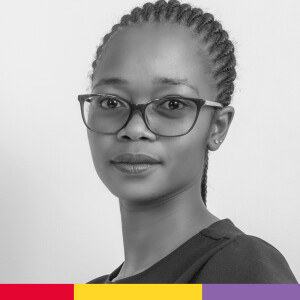
Sunday Aug 27, 2023
S5 E11: #Tech4Rights: Privacy and Data Protection in the Lesotho
Sunday Aug 27, 2023
Sunday Aug 27, 2023
In conversation with Tlhaloso Mpopo and Hlengiwe Dube
The Centre for Human Rights, University of Pretoria undertook a research and advocacy project that sought to assess the status of Digital rights in Southern Africa. As guided by the report titled The Digital Rights Landscape in Southern Africa, the Centre embarked on a training and capacity-building workshop to enhance awareness and interest in digital rights among parliamentarians. This podcast series features various stakeholders who share their expertise on thematic stakeholders that were covered during the training.
In this episode, Tlhaloso Mpopo and Hlengiwe Dube, discuss privacy and data protection in Lesotho. Tlhaloso reflects on the significance of the right to privacy and data protection and she describes the current data protection framework in Lesotho and subsequently the gaps in the framework. This conversation also spotlights knowledge gaps among stakeholders, the absence of a data protection authority and the levels of awareness of the rights to privacy and data protection amongst Basotho.
Tlhaloso Mpopo is a duly admitted advocate of the courts of Lesotho and a tech policy fellow at the Lawyers Hub. She is a legal technology and technology law enthusiast based in Maseru, Lesotho. She currently works at the National University of Lesotho, Centre for Teaching and Learning in the EduTech Unit. Her responsibilities include capacity building and training as well as policy development on issues such as data privacy and protection, intellectual property, artificial intelligence, and cybersecurity.
Hlengiwe Dube is a Project Manager of the Expression, Information and Digital Rights Unit at the Centre for Human Rights, University of Pretoria.
This conversation was recorded on 18 July 2023.
Music and news extracts: Inner Peace by Mike Chino https://soundcloud.com/mike-chinoCreative Commons — Attribution-ShareAlike 3.0 Unported — CC BY-SA 3.0 http://creativecommons.org/licenses/b...Music promoted by Audio Library https://youtu.be/0nI6qJeqFcc limitless https://stock.adobe.com/za/search/audio?k=452592386
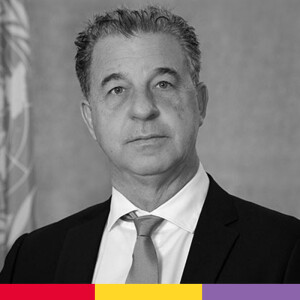
Thursday Aug 17, 2023
Thursday Aug 17, 2023
In conversation with Dr Serge Brammertz
On 2 August 2023, the Centre for Human Rights, Faculty of Law, University of Pretoria (the Centre) co-hosted Dr Serge Brammertz, Chief Prosecutor of the United Nations International Residual Mechanism for Criminal Tribunals (IRMCT). The theme of Dr Brammertz’s lecture was on the development and transformation of international criminal law as a branch of international law, and he also spoke about contemporary issues in the field.
During Dr Brammertz's visit to the Centre, Africa Rights Talk had a conversation with Dr Brammertz on themes covered in his lecture and on various aspects of international criminal justice. Dr Brammertz highlighted the evolution of international tribunals, the importance of state cooperation, the contribution of the mechanism to accountability and rule of law, the engagement and support of victims, the capacity building of domestic judiciaries, and the challenges and solutions for cross-border cooperation in criminal investigations. In conclusion, he provided examples, insights, and recommendations based on his role as the Chief Prosecutor of the most complex international criminal cases.
Dr Serge Brammertz is a Belgian prosecutor and jurist, who leads the International Residual Mechanism for Criminal Tribunals (IRMCT) since 2016. He is also the former chief prosecutor of the International Criminal Tribunal for the former Yugoslavia (ICTY). In this role, Dr. Brammertz was responsible for the prosecution of all trials and appeals before the Tribunal. Prior to joining the ICTY, Dr. Brammertz was the Commissioner of the United Nations International Independent Investigation Commission (UNIIIC) in Beirut, Lebanon. Dr. Brammertz headed the investigation into the murder of former Lebanese Prime Minister Rafik Hariri from January 2006 until the end of 2007. He has a PhD in international law and has taught at several universities.
Watch on YouTube: https://youtu.be/6HtFV83Wr8M
This conversation was recorded on 2 August 2023.
Music and news extracts: Inner Peace by Mike Chino https://soundcloud.com/mike-chinoCreative Commons — Attribution-ShareAlike 3.0 Unported — CC BY-SA 3.0 http://creativecommons.org/licenses/b...Music promoted by Audio Library https://youtu.be/0nI6qJeqFcc limitless https://stock.adobe.com/za/search/audio?k=452592386
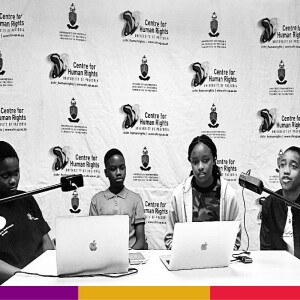
Monday Aug 14, 2023
S5 E9: Insights from Children on Mental Health in Schools
Monday Aug 14, 2023
Monday Aug 14, 2023
In conversation with Tshiamo Mpangeni, Panji Chirambo, Al-Amin Abdallah and Jolene Kibor.
On 2 August 2023, the Centre for Human Rights, Faculty of Law, University of Pretoria, hosted a child-led conference on children’s mental health in Schools in Africa. The conference was attended by children from Cameroon, Ethiopia, Democratic Republic of Congo, Kenya, South Africa, Malawi and Zimbabwe.
During this conference, Africa Rights Talk had a conversation with the participants children from Malawi and Kenya, namely, Tshiamo Mpangeni, Panji Chirambo, Al-Amin Abdallah and Jolene Kibor. They shared their understanding of mental health issues, the importance of child participation in mental health discussions, understanding the challenges that plague children concerning mental health, and what their individual countries can do to better approach mental health challenges amongst children and young adults in schools.
The Children’s Rights Unit at the Centre for Human Rights, University of Pretoria was established in 2013 to advocate for matters the protection of children's rights. The Unit works through research, advocacy, and training, to contribute to the regional discourse on the rights of children in Africa and beyond. In line with the Centre’s mission, the work of the Unit has a pan-African reach, while seeking to foster a contextually relevant understanding of global issues and concerns to children in Africa. The Unit provides an essential bridge between academic research and evidence-based advocacy in the African region.
This conversation was recorded on 3 August 2023.
Music and news extracts: Inner Peace by Mike Chino https://soundcloud.com/mike-chinoCreative Commons — Attribution-ShareAlike 3.0 Unported — CC BY-SA 3.0 http://creativecommons.org/licenses/b...Music promoted by Audio Library https://youtu.be/0nI6qJeqFcc limitless https://stock.adobe.com/za/search/audio?k=452592386
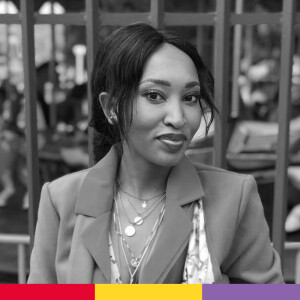
Monday Aug 07, 2023
S5 E8: #Tech4Rights: Women’s Rights in the Digital Age in Lesotho
Monday Aug 07, 2023
Monday Aug 07, 2023
In conversation with Sibongile Mokapane and Ompha Tshamano.
In 2022, The Centre for Human Rights, University of Pretoria undertook a research and advocacy project that assessed the status of digital rights in Southern Africa. Guided by the report titled The Digital Rights Landscape in Southern Africa, the Centre embarked on a training and capacity-building workshop to enhance awareness and interest in digital rights among parliamentarians. This podcast series features various stakeholders who share their expertise on thematic areas covered during the training.
In this episode, Sibongile Mokapane and Ompha Tshamano discuss women’s rights in the digital age in Lesotho, including the gender-digital divide. Sibongile shares her observations on the patriarchal power dynamics in the digital spaces and acknowledges that the cyberspace mimics the patriarchal power dynamics that are found offline. This conversation also explores the various forms of abuse and challenges that women face while accessing digital spaces in Lesotho.
Sibongile Mokapane is a passionate human rights lawyer specializing in women’s and children's rights, digital rights, and gender issues. With an LLB and an LLM degree, she is an advocate admitted to practice and currently working as an advocacy specialist at Politics4Her, focusing on the Women's Leadership and Political Participation portfolio. Sibongile's dedication to justice extends beyond her professional life. She is deeply committed to addressing the unique challenges faced by women and children, using her expertise in human rights law to advocate for their rights. Through her legal skills, advocacy efforts, and unwavering commitment, Sibongile strives to create positive change in her community and contribute to a more equitable society.,
Ompha Tshamano is an LLM Candidate at the University of Pretoria and a Project Associate at the Expression, Information and Digital Rights Unit at the Centre for Human Rights, University of Pretoria.
This conversation was recorded 21 July 2023.
Music and news extracts: Inner Peace by Mike Chino https://soundcloud.com/mike-chinoCreative Commons — Attribution-ShareAlike 3.0 Unported — CC BY-SA 3.0 http://creativecommons.org/licenses/b...Music promoted by Audio Library https://youtu.be/0nI6qJeqFcc limitless https://stock.adobe.com/za/search/audio?k=452592386
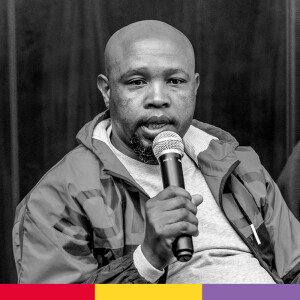
Saturday Aug 05, 2023
S5 E7: #Tech4Rights: The Information Disorder and Freedom of Expression in Lesotho
Saturday Aug 05, 2023
Saturday Aug 05, 2023
In conversation with Lekhetho Makhanya Ntsukunyane and Marystella Simiyu.
In 2022, The Centre for Human Rights, University of Pretoria undertook a research and advocacy project that assessed the status of digital rights in Southern Africa. Guided by the report titled The Digital Rights Landscape in Southern Africa, the Centre embarked on a training and capacity-building workshop to enhance awareness and interest in digital rights among parliamentarians. This podcast series features various stakeholders who share their expertise on thematic areas covered during the training.
In this episode, Lekhetho Ntsukunyane and Marystella Simiyu discuss how freedom of expression is protected under the legal framework in Lesotho. Lekhetho explores the challenges faced by the Basotho people in exercising their freedom of expression.
Amidst these difficulties, information disorder is polluting the information ecosystem. Lekhetho expands on the prevalence of information disorder in Lesotho and recommends right-based approaches to curb information disorder in the country.
Lekhetho is a print journalist based in Maseru, Lesotho. He is currently the director at the Media Institute of Southern Africa – Lesotho Chapter (MISA Lesotho). He is a well-known investigative journalist, whose work has been published in South Africa with AmaBhungane Centre for Investigative Journalism, Daily Maverick, among others. In Lesotho, he has worked as a senior reporter with weekly national newspapers including Lesotho Times, Public Eye and Sunday Express. In 2016, Lekhetho co-founded the MNN Center for Investigative Journalism, together with two other investigative journalists in Maseru.
Marystella Simiyu is a lawyer and a doctoral candidate at the University of Pretoria. She is also a Project Officer at the Expression, Information and Digital Rights Unit at the Centre for Human Rights, University of Pretoria.
This conversation was recorded 20 July 2023.
Music and news extracts: Inner Peace by Mike Chino https://soundcloud.com/mike-chinoCreative Commons — Attribution-ShareAlike 3.0 Unported — CC BY-SA 3.0 http://creativecommons.org/licenses/b...Music promoted by Audio Library https://youtu.be/0nI6qJeqFcc limitless https://stock.adobe.com/za/search/audio?k=452592386
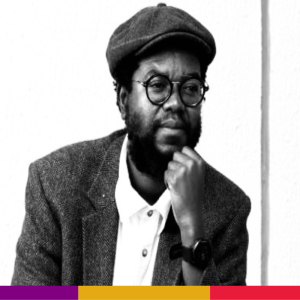
Tuesday Jul 18, 2023
S5 E6: Reflections on Mandela Day with Dr Ndumiso Dladla
Tuesday Jul 18, 2023
Tuesday Jul 18, 2023
In conversation with Dr Ndumiso Dladla
Mandela Day is commemorated annually on 18 July to celebrate the life and legacy of Nelson Mandela in the fight for the liberation of South Africa from apartheid laws and the fostering of peace on the African continent. In this episode of Africa Rights Talk we speak to Dr Ndumiso Dladla, who acknowledges the impact of Nelson Mandela, but warns about the deification of Nelson Mandela as opposed to reflections on many other unsung heroes who have also fought for freedom of black South Africans from oppression.
Dr Dladla highlights the importance of historical accuracy of the histories of unfreedom and that we must seek the truth in order to address our oppression. He calls on Africans to unite across the continent, engage in conscientious conversations about liberation and seek the historical truth in contextualising colonial conquest of the African people and the ramifications of such conquest in today's world.
Dr Ndumiso Dladla is a philosopher, academic and writer who holds a BA (Philosophy and Private Law), BA [Hons] (Philosophy) as well as an MA (Philosophy) from the University of South Africa and an LLD (Jurisprudence) from the University of Pretoria. He was appointed as Senior Lecturer in the Department of Jurisprudence from February 2022. His research interests are African Philosophy, Social and Political Philosophy, Critical Race Theory, Black Radical Historiography. He has published many articles and books. Here are some selected published works:
- 2018) The liberation of history and the end of South Africa: some notes towards an Azanian historiography in Africa, South1, South African Journal on Human Rights, 34:3, 415-440, DOI: 10.1080/02587203.2018.1550940
- (2020) Here is a Table: A Philosophical Essay on History and Race in South Africa, African SUN Media Press, Stellenbosch ISBN : 9781928314783
- (2021) (Editor) “The Azanian Philosophical Tradition Today” Theoria: Journal of Social and Political Theory, Issue 168, Vol. 68, No. 3
This conversation was recorded 17 July 2023.
Music and news extracts: Inner Peace by Mike Chino https://soundcloud.com/mike-chinoCreative Commons — Attribution-ShareAlike 3.0 Unported — CC BY-SA 3.0 http://creativecommons.org/licenses/b...Music promoted by Audio Library https://youtu.be/0nI6qJeqFcc limitless https://stock.adobe.com/za/search/audio?k=452592386
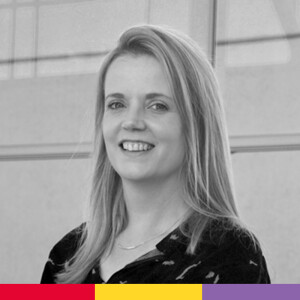
Thursday Jul 13, 2023
Thursday Jul 13, 2023
In conversation with Dr Mispa Roux
The Russia-Ukrainian War is an ongoing international conflict between Russia, alongside Russian-backed separatists, and Ukraine, which began in February 2014. The conflict escalated into a full-scale war in 2022 when Russia launched a full-scale invasion of Ukraine on February 24. Although Russian forces made significant gains in the first days of combat, Ukrainian defenders rebuffed attempts to seize Kyiv and other major cities and were soon launching counter attacks at Russian positions. Since then, the war has resulted in thousands of deaths and injuries on both sides. South Africa and Russia have been deepening their military ties. The South African military hosted a joint military exercise with Russia and China on its east coast from February 17 to 27, 2023. However, South Africa’s warm relationship with Russia has caused a growing national and global concern that the country has decided to back Russia in its war against Ukraine, and perhaps even to send Russia weapons. Africa Rights Talk speaks to Dr Roux on the Russian-South Africa allyship and its impacts on South Africa’s commitment to protection of human rights.
Dr Roux discusses South Africa’s obligations under international human rights law, the powers and limitations of the International Criminal Court (ICC) regarding prosecution of human rights violations, crimes against humanity and abuse of power. Importantly, she expressed disappointment in South Africa’s non alignment approach to the Russia-Ukraine war and its decision not to prosecute or arrest Russia’s Vladimir Putin. She notes that South Africa’s protection of criminals of war validates impunity against the victims of war. She concludes that even though South Africa pulls out of the ICC to protect Russia, South Africa still has obligations under its constitution and local laws to bring criminals like Vladimir Putin to justice. She hopes that South Africa does the right thing in the end to uphold international human rights standards. See link to her Op-Ed:
Dr Mispa Roux is a project coordinator for the Swedish International Development Cooperation Agency (SIDA) and Centre for Human Rights, University of Pretoria’s joint project for Sexual and Reproductive Rights in Africa (SSRA).This project is to strengthen the protection of sexual and reproductive health rights in Africa. Her academic and research interests include sexual and gender based violence in domestic and global contexts, international human rights law, and international criminal law and the intersectionality of both areas. Her doctoral thesis was entitled ‘A comparative analysis of the causes for breaching the erga omnes obligation to prevent and prosecute gross human rights violations’. She is also a senior research officer in the NRF SARChI Chair for International Constitutional Law at the University of Pretoria.
This conversation was recorded 05 July 2023.
Music and news extracts: Inner Peace by Mike Chino https://soundcloud.com/mike-chinoCreative Commons — Attribution-ShareAlike 3.0 Unported — CC BY-SA 3.0 http://creativecommons.org/licenses/b...Music promoted by Audio Library https://youtu.be/0nI6qJeqFcc limitless https://stock.adobe.com/za/search/audio?k=452592386
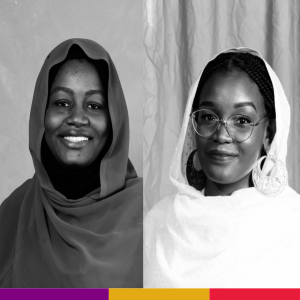
Tuesday Jul 04, 2023
S5 E4: The Sudan crisis and its implications on human rights
Tuesday Jul 04, 2023
Tuesday Jul 04, 2023
In conversation with Safa Idress and Mai Aman
This episode, in conversation with Ms Safa Idress and Ms Mai Aman, sheds light on the current Sudan crisis. On April 15 2023, the Sudanese Armed Forces (SAF) and military rival, the Rapid Support Forces (RSF) clashed in Khartoum, the country’s capital as a result of a power struggle within the country’s military leadership. Idress and Aman were saddened to note the devastating human rights violations including sexual and gender-based violence against women, thousands of civilian deaths and about 1.2 million people displaced causing an ongoing humanitarian crisis in Sudan. In conclusion, Ms Idress and Ms Aman call for ceasefire, accountability of the perpetrators of this war, and that the Sudanese authorities take credible steps towards reinstatement of a civilian administration with democracy and rule of law at its core, and to a path towards justice, equality, dignity and peace for the Sudanese people.
Safa Idress is a Sudanese lawyer, who obtained her LLB from the University of Khartoum, Sudan and is an LLM Candidate in Human Rights and Democratisation at the Centre for Human Rights, Faculty of Law, University of Pretoria. Her academic and research interests include women’s rights, environmental rights, and intersectionality of business and human rights. She has worked as a paralegal at the People's Legal Aid Centre, which offers free legal services to marginalised groups in Sudan, particularly women. In 2019, she assumed the position as a legal officer upon completion of her bar exams. In 2022, she was a legal fellow at the Institute of Human Rights and Development in Africa, The Gambia.
Mai Aman is a Sudanese lawyer, who obtained her LLB from the University of Khartoum, and LLM in Human Rights and Democratisation in Africa from the Centre for Human Rights, Faculty of Law, University of Pretoria. She is currently an LLD candidate in human rights law specialising in children's rights. She currently works as a project officer for the children’s right unit at the Centre for Human Rights, University of Pretoria.
This conversation was recorded on 29 June 2023.
Music and news extracts: Inner Peace by Mike Chino https://soundcloud.com/mike-chinoCreative Commons — Attribution-ShareAlike 3.0 Unported — CC BY-SA 3.0 http://creativecommons.org/licenses/b...Music promoted by Audio Library https://youtu.be/0nI6qJeqFcc limitless https://stock.adobe.com/za/search/audio?k=452592386

